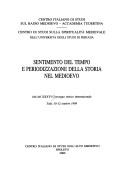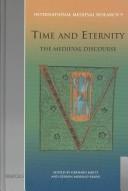| Listing 1 - 10 of 12 | << page >> |
Sort by
|
Book
ISBN: 8822249291 9788822249296 Year: 2000 Publisher: Firenze : Leo S. Olschki,
Abstract | Keywords | Export | Availability | Bookmark
 Loading...
Loading...Choose an application
- Reference Manager
- EndNote
- RefWorks (Direct export to RefWorks)
Time --- History --- Hours (Time) --- Geodetic astronomy --- Nautical astronomy --- Horology --- Time - History - To 1500 - Congresses --- TEMPS --- HISTORIOGRAPHIE --- HISTOIRE --- PHILOSOPHIE --- MOYEN AGE
Book
ISBN: 3050028831 9783050028835 Year: 1996 Volume: 74,3 Publisher: Berlin : Akademie-Verlag,
Abstract | Keywords | Export | Availability | Bookmark
 Loading...
Loading...Choose an application
- Reference Manager
- EndNote
- RefWorks (Direct export to RefWorks)
Time --- History --- -Hours (Time) --- Geodetic astronomy --- Nautical astronomy --- Horology --- -Augustine Saint, Bishop of Hippo --- -History --- Augustine, --- Time - History - To 1500. --- Augustin (saint ; 354-430) --- Critique et interpretation
Book
ISBN: 9782070177691 2070177696 Year: 2016 Publisher: Place of publication unknown Gallimard
Abstract | Keywords | Export | Availability | Bookmark
 Loading...
Loading...Choose an application
- Reference Manager
- EndNote
- RefWorks (Direct export to RefWorks)
Les rythmes entraînent dans leur mouvement la vie tout entière des individus et des sociétés : les comportements quotidiens et les expériences esthétiques, les déplacements dans l'espace aussi bien que l'ordre du temps. Il n'y a pas de vie sans rythme, c'est-à-dire – comme dans un air de jazz ou une toile abstraite de Mondrian – sans une mise en ordre variable de faits qui se répètent en combinant indéfiniment périodicité et rupture.Philosophes, sociologues, anthropologues, musicologues s'interrogent parmi d'autres depuis deux siècles sur les rythmes sociaux, dont Marcel Mauss disait qu'ils commandent les représentations du temps. Pourtant, il n'existe pas à ce jour une histoire des rythmes qui confronte nos conceptions et expériences du rythme à celles du passé. Or, le contraste est fort entre notre monde moderne, où les rythmes sont partout, mais sont observés dans des champs séparés (rythmes scolaires, arythmie cardiaque, tempo musical, croissance économique en dents de scie ... ) et la civilisation holiste de l'Europe médiévale : ici, la notion de rythme, héritée de l'Antiquité gréco-romaine, paraît ne concerner que la musique, la poésie et la danse, mais elle entre en fait en résonance avec la totalité de la Création, que Dieu aurait façonnée en six jours.C'est à ce rythme fondateur que le présent livre emprunte sa propre scansion, en explorant successivement les significations du rhythmus médiéval, les rythmes du corps et du monde, ceux du temps, de l'espace et du récit, avant de s'interroger sur la fonction des rythmes dans le changement social et la marche de l'histoire.
History of civilization --- History of Europe --- anno 800-1199 --- anno 1200-1499 --- Rhythm --- Civilization, Medieval --- Rythme --- Civilisation médiévale --- Rythmes biologiques --- Temps (philosophie) --- Temps --- Histoire universelle --- Espace et temps --- Sociologie --- Biological rhythms --- Cycles --- Space and time --- Time --- Social aspects --- History --- Civilisation médiévale --- Histoire universelle. --- Espace et temps. --- Space and time - Social aspects --- Time - History - To 1500
Book
ISBN: 3525251661 9783525251669 Year: 1982 Volume: Heft 70 Heft 70.
Abstract | Keywords | Export | Availability | Bookmark
 Loading...
Loading...Choose an application
- Reference Manager
- EndNote
- RefWorks (Direct export to RefWorks)
Time --- Temps --- History --- Histoire --- Simplicius, --- -Hours (Time) --- Geodetic astronomy --- Nautical astronomy --- Horology --- -Simplicius of Cilicia --- -Contributions in concept of time --- -History --- Space and time --- Espace et temps --- Ouvrages avant 1800 --- Simplikios, --- Σιμπλίκιος, --- Pseudo-Simplicius --- Simplikios --- Simplikios of Cilicia --- Σιμπλίκιος ὁ Κίλιξ --- Simplikios ho Kilix --- Simplicius van Cilicië --- Simplice de Cilicie --- Time - History - To 1500 --- Simplicius, - of Cilicia

ISBN: 8879884034 9788879884037 Year: 2000 Volume: nuova ser., 13 Publisher: Spoleto : Centro Italiano di Studi sull'Alto Medioevo,
Abstract | Keywords | Export | Availability | Bookmark
 Loading...
Loading...Choose an application
- Reference Manager
- EndNote
- RefWorks (Direct export to RefWorks)
Time --- History --- Middle Ages --- Temps --- Histoire --- Moyen Age --- Congresses --- Periodization --- Historiography --- Congrès --- Périodisation --- Historiographie --- -Time --- -Hours (Time) --- Geodetic astronomy --- Nautical astronomy --- Horology --- Annals --- Auxiliary sciences of history --- -History --- -Periodization --- Congrès --- Périodisation --- Hours (Time) --- Congresses. --- History - Periodization - Congresses. --- Time - History - To 1500 - Congresses. --- HISTORIOGRAPHIE --- ESCHATOLOGIE --- HISTOIRE --- MOYEN AGE --- PERIODISATION

ISBN: 2503513123 9782503513126 9782503526300 Year: 2003 Volume: 9 Publisher: Turnhout Brepols
Abstract | Keywords | Export | Availability | Bookmark
 Loading...
Loading...Choose an application
- Reference Manager
- EndNote
- RefWorks (Direct export to RefWorks)
This volume is composed of selected papers from the main strand ‘Time and Eternity’ at the seventh International Medieval Congress held in July 2000. It attests to the fact that the medieval experience of time and eternity was rich and complex, and that its investigation is open to various approaches and methods. Time and (the possibility or impossibility of) its beginning and its end were frontiers to be explored and to be understood.To make the reader more familiar with the field of study, the volume begins with Wesley Stevens’s plenary address ‘A Present Sense of Things Past: Quid est enim tempus?’, a stimulating introduction not only with regard to some of the basic problems in conceptualizing the nature of time but also to the dating of historical events and the use of calendars for that purpose.Following Stevens’s essay, the volume is organised into seven broader themes covering a variety of questions and trying to offer new insights into the medieval perception and constructions of time. They deal with the computation of time and the use of calendars; Jewish concepts of time and redemption; Christian philosophies of eternity and time; monastic and clerical conceptions; literary representations; time and art; and apocalyptic expectations. The volume’s selection of authors is international in scope and represents some of the leading current scholarship in the field. It proves that we still ‘thirst to know the power and the nature of time’ (St Augustine).
History of civilization --- Philosophy and psychology of culture --- Chronology --- anno 500-1499 --- Time --- Eternity --- Philosophy, Medieval --- History --- Hours (Time) --- Geodetic astronomy --- Nautical astronomy --- Horology --- Infinite --- Future life --- Time - History - To 1500 - Congresses. --- Eternity - History - To 1500 - Congresses. --- Philosophy, Medieval - Congresses. --- TEMPS --- HISTORIOGRAPHIE --- HISTOIRE --- PHILOSOPHIE --- MOYEN AGE
Book
ISBN: 9782600047524 2600047522 2600147527 Year: 2017 Publisher: Genève: Droz,
Abstract | Keywords | Export | Availability | Bookmark
 Loading...
Loading...Choose an application
- Reference Manager
- EndNote
- RefWorks (Direct export to RefWorks)
Contributions interdisciplinaires sur le latin médiéval comme une langue vivante confrontée à un idéal antique mais aussi réinventée sans cesse par ses locuteurs.--[Memento]
Latin language, Medieval and modern. --- Time measurements. --- Time --- Time perception --- Philosophy, Medieval --- History --- Religious aspects --- Christianity --- History of doctrines --- Time - History - To 1500 - Congresses --- Time perception - History - To 1500 - Congresses --- Time - Religious aspects - Christianity - History of doctrines - Middle Ages, 600-1500 - Congresses. --- Philosophy, Medieval - Congresses
Book
ISBN: 9061867835 9789061867838 Year: 1996 Volume: 16 Publisher: Leuven Presses universitaires de Louvain
Abstract | Keywords | Export | Availability | Bookmark
 Loading...
Loading...Choose an application
- Reference Manager
- EndNote
- RefWorks (Direct export to RefWorks)
Filosofie van de Middeleeuwen --- Filosofie van de Oudheid --- Philosophie de l'Antiquité --- Philosophie du Moyen Age --- Philosophy, Medieval --- Time --- Philosophie médiévale --- Temps (Philosophie) --- Philosophy --- Philosophy, Medieval. --- History --- -Academic collection --- #GOSA:II.P.AU.3 --- #GOSA:XX.III.D.Aeg-R.M --- Hours (Time) --- Geodetic astronomy --- Nautical astronomy --- Horology --- Medieval philosophy --- Scholasticism --- -Philosophy, Medieval --- -Philosophy, Medieval. --- Philosophie médiévale --- Academic collection --- Time - History - To 1500.
Book
ISBN: 326103999X 9783261039996 Year: 1989 Volume: 8 Publisher: Frankfurt am Main New York Peter Lang
Abstract | Keywords | Export | Availability | Bookmark
 Loading...
Loading...Choose an application
- Reference Manager
- EndNote
- RefWorks (Direct export to RefWorks)
Time --- Eternity --- Philosophy, Medieval. --- History --- Philosophy, Medieval --- -Time --- -Hours (Time) --- Geodetic astronomy --- Nautical astronomy --- Horology --- Infinite --- Future life --- Medieval philosophy --- Scholasticism --- -History --- -Dietrich von Freiberg --- -Eckhart Meister --- -Contributions in concept of time --- Contributions in concept of time --- Dietrich, --- Eckhart, --- Eckart, --- Eckehart, --- Eckhart, Johannes, --- Ekharti, --- Ėkkhart, --- Dietrich von Freiberg, --- Freiberg, Dietrich von, --- Teodorico, --- Teodorico di Vriberg, --- Theodoric, --- Theodericus Teutonicus, --- Theodoricus, --- Theodoricus Saxo, --- Theodoricus Teutonicus, --- Thierry, --- Von Freiberg, Dietrich, --- Time - History - To 1500. --- Eternity - History - To 1500.
Book
ISBN: 0226310795 9780226310794 Year: 1987 Publisher: Chicago (Ill.): University of Chicago press
Abstract | Keywords | Export | Availability | Bookmark
 Loading...
Loading...Choose an application
- Reference Manager
- EndNote
- RefWorks (Direct export to RefWorks)
Time --- Political science --- History --- Philosophy --- Plato --- -Political science --- -Time --- -Hours (Time) --- Geodetic astronomy --- Nautical astronomy --- Horology --- Administration --- Civil government --- Commonwealth, The --- Government --- Political theory --- Political thought --- Politics --- Science, Political --- Social sciences --- State, The --- Annals --- Auxiliary sciences of history --- -History --- -Plato --- Aflāṭūn --- Aplaton --- Bolatu --- Platon, --- Platonas --- Platone --- Po-la-tʻu --- Pʻŭllatʻo --- Pʻŭllatʻon --- Pʻuratʻon --- Πλάτων --- אפלטון --- פלאטא --- פלאטאן --- פלאטו --- أفلاطون --- 柏拉圖 --- 플라톤 --- -Philosophy --- History, Modern --- Plato. --- Platon --- Platoon --- Платон --- プラトン --- Time - History - To 1500 --- History - Philosophy
| Listing 1 - 10 of 12 | << page >> |
Sort by
|

 Search
Search Feedback
Feedback About UniCat
About UniCat  Help
Help News
News